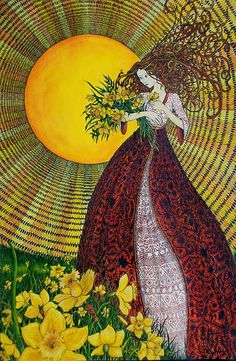by Fraser Hibbitt for the Carl Kruse Blog
The coming of Spring is the headlong fall into light and day. The day is everything for affirmation, though what is affirmed is figured first, darkly, in the night. In the spring, D.H. Lawrence wonders what he is in the midst of the ‘leaping combustion of spring’: ‘… My spirit is tossed / about like a shadow buffeted in the throng / of flames, a shadow that has gone astray, and is lost’. Wordsworth’s spring makes him lament ‘what man has made of man’; Shakespeare makes his spring the bane of the married man, what with its loose gaiety.
And walking in the city, spring begins to be seen in the cracks between paving stones, where little crocuses being to sprout as a prelude; one sees the first daffodils in a tended garden, or a community plot has some flowering quince. The twilight is being stretched ever more every day and draws out the composition of the sky in light red hues, and the buildings fare better in our eyes. Winter is relenting, or gratefully giving up the mantle as spring begins to robe. Nobody can deny the late winter sky slowly going into the night. The meeting between things seems to be drawn out, not out of indecision, but for the pleasure of a full display; the things that could-be, a gist of the possible variations of a dance.

“Is it only pleasure, then? Do we get the hope of rebirth and redemption? Flowers and birdsong, long skies, and the temperate weather; it is a good thing that we are so forgetful. They break out of winter and forget they were there last year; with the seasons, humanity is like a shadow that has gone astray, always out of touch, waiting for the season to remind him of something important. Those huge psychological hopes. You are the same bloody person, putting on airs! It’ll be hoping this year, and hope the next, you’ll feel “redeemed” now, but it is only a minor expenditure; you’ll be “redeemed” again, by your will or without it“: you want to say when nothing happens, missing the whole point, or perhaps too keenly expecting.
This is all something above spring. It has nothing to do with our hopes, but by some strange connection, it enriches us and forces our attention to that fact of change. Things change, even delightfully, as opposed to the subjective sense of self that we know changes in a way but rarely the way we thought it would – which can often also be a delight. Spring is a reaping of the rewards and everything that has been now seemed necessary: the long nights of winter, the cold, bleak trees, and the desire for time to pass.
What is dormant arises and, though imprinted in the mind from all the years it has been experienced, still truly surprises, like any flowering. Things are thrown out, or filled in; all the empty spaces that occupied winter are brimming, and so perhaps too it is with the mind. “Ah, I’ll just sit here awhile”, or “oh, that bush smells lovely, do you know the name of it?” All the flowers, and birds, beg to be named. Curiosity begins to work from outside-in and inside-out.
It is fine if we are “forgetful”, for the pleasure of being reminded, in every sense of the word. That act of remembrance brings forth years of experience. Blake, who sang of coming face to face with the lamb in spring: ‘come and lick my white neck; / let me pull your soft wool’, could say it quite confidently, knowing what lived in hell. Blake’s song welcomes the spring knowing that it’ll be over but the moment with the spring lamb will not be over anytime soon, that is what elevates the song above the words, the season above the embellishments. Life appears to come together with spring’s trumpet, which means respect for everything that has fallen apart and has now fallen into place.
===========
The Carl Kruse Blog Homepage is here.
Contact: carl AT carlkruse DOT com
Other articles on Spring in the blog include: The Spring Equinox and Eggs and It’s Spring Again.
An older Carl Kruse Blog.

Yay! It is Spring!